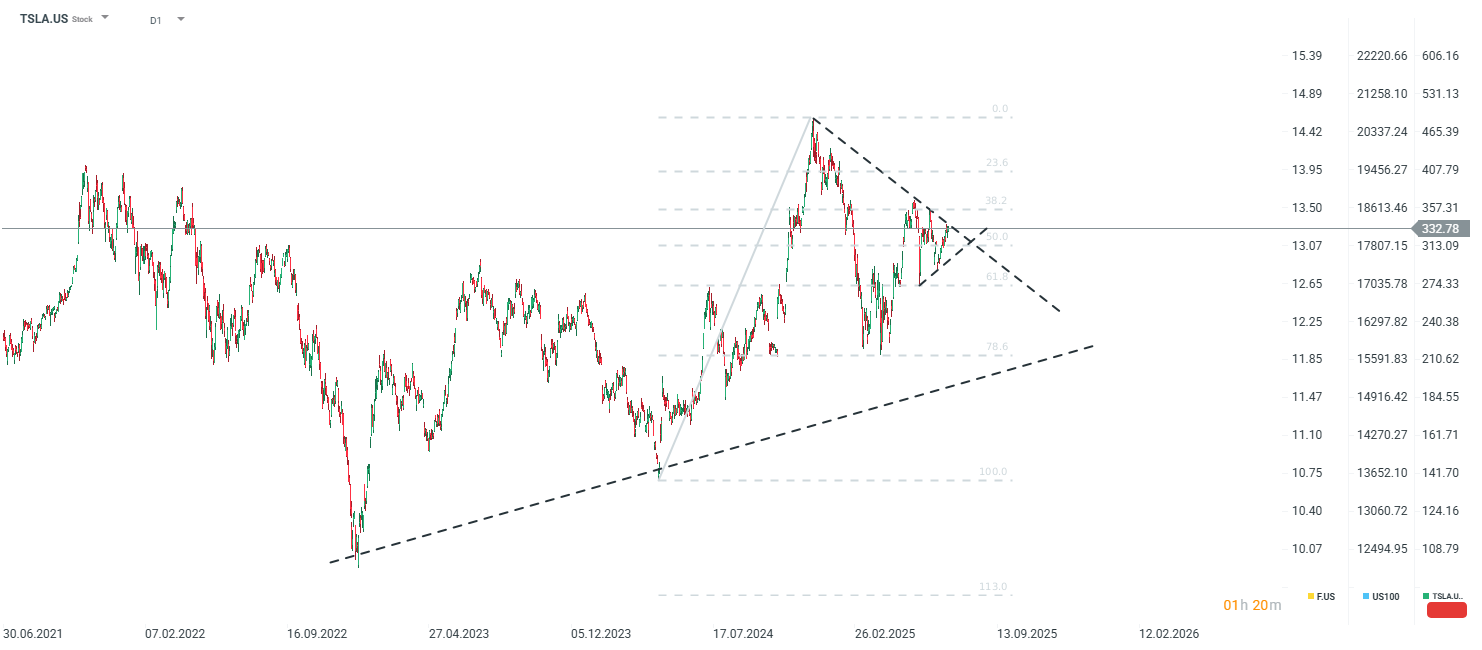Tesla's Q2 2025 Financial Results
Tesla's second-quarter 2025 financial performance painted a mixed picture, revealing both challenges in its core automotive business and strategic diversification efforts.
-
Adjusted Earnings Per Share (EPS): Tesla reported an adjusted EPS of $0.40, a notable decline from $0.52 in the prior-year period and falling short of Bloomberg's consensus estimate of $0.42. This decline in profitability is largely attributed to lower vehicle deliveries and persistent pricing pressures within the intensely competitive electric vehicle (EV) market.
-
Unadjusted EPS: Unadjusted EPS stood at $0.33, down from $0.42 year-on-year, further underscoring the weakening earnings trajectory.
-
Revenue: Total revenue for the quarter reached $22.50 billion, representing a 12% year-on-year decrease and slightly below expectations of $22.64 billion. Reduced vehicle deliveries, totaling 384,122 units (a 13% year-on-year decline), were the primary drag. However, the energy generation and storage segment (9.6 GWh of energy storage deployed) and services partially offset these automotive-related losses.
-
Gross Margin: The gross margin came in at 17.2%, surpassing expectations of 16.5% but lower than the 18% reported a year ago. This suggests effective cost management, particularly within the energy and services divisions, despite a challenging market environment. Nonetheless, it's worth noting that as an automotive manufacturer, Tesla's performance has been subdued since the beginning of the year.
-
Operating Income: Operating income reached $923 million, significantly below estimates of $1.23 billion, reflecting the difficulties in generating operational profits amid reduced revenues.
-
Free Cash Flow: Free cash flow stood at a modest $146 million, substantially below the anticipated $760 million. This shortfall may be attributed to higher capital expenditures related to new projects, including new vehicle platforms and infrastructure development.
Tech Company or Just an Auto Manufacturer?
Tesla's Q2 2025 results illuminate a company at a crossroads, navigating a complex landscape. The 13% drop in vehicle deliveries to 384,122 units, coupled with a 12% revenue decline to $22.5 billion, underscores the formidable challenges confronting the EV manufacturer in an increasingly saturated market. Profitability has also softened, with net income falling to $1.17 billion, a 16% decrease year-on-year, and free cash flow dramatically shrinking to $146 million, pointing to intensive investments and operational hurdles.
The decline in sales volume is primarily a consequence of escalating competition, notably from Chinese powerhouses such as BYD and Geely, alongside delays in introducing a more affordably priced model lineup. The Model Y and Cybertruck are experiencing distinct demand issues, and the brand's reputation faces risks stemming from Elon Musk's politically charged activities, which could deter certain customer segments, particularly in European and American markets.
Despite these headwinds, Tesla is not merely mitigating the impact of declining automotive sales but is also vigorously expanding its energy segment, which is emerging as a critical pillar of the company's operations. The firm deployed 9.6 GWh of energy storage capacity, achieving new deployment records, and its Supercharger network expanded by nearly 3,500 new points, strengthening Tesla's ecosystem and customer support. This strategic maneuver highlights Tesla's concerted effort to diversify its revenue streams.
The company's forward-looking focus is also evident in its substantial investments in autonomous technologies and AI. A pilot Robotaxi service has been launched in Austin, and the company continues to refine its Full Self-Driving (FSD) software, which underpins its ambitions to revolutionize transportation. Elon Musk has articulated a vision of Tesla as a leader in robotics and AI, emphasizing that future services and technologies could unlock significant value for the company. Concurrently, Tesla has commenced production of its initial lower-priced models, with output expected to accelerate in the second half of the year, potentially reversing the negative sales trend and attracting new customers. However, it's pertinent to note that Robotaxi already faces considerable competition in numerous Western US cities, primarily from Waymo. This suggests that while Tesla long held a dominant position in electric vehicles, it may not necessarily secure the top spot in autonomous ride-hailing.
The company's robust financial position is underscored by a record cash and investments balance of $36.8 billion, affording it the flexibility to pursue costly projects and manage macroeconomic and market risks. Nevertheless, investors are aware that short-term challenges, such as the expiration of EV tax credits in the US and rising tariffs on raw materials, could weigh on results in the coming quarters.
The market's reaction to the earnings was moderately positive, with the share price increasing by 0.6%, indicating investor confidence in Tesla's potential across key areas of AI, autonomy, and energy, despite the current financial disappointments. This initial gain, however, was swiftly neutralized. Nonetheless, Elon Musk's subsequent remarks may yet significantly influence the perception of the company's performance.
In conclusion, Tesla's second quarter of 2025 reflects a delicate balance between market challenges and an ambitious business transformation. Declining deliveries and lower profitability necessitate swift adaptation, yet the company is heavily investing in the development of autonomous services and the energy segment, while also preparing for substantial growth through more affordable models. The results were not as negative a surprise as the Q1 publication, although generally, as an automotive manufacturer, the company is performing increasingly poorly, primarily against the backdrop of rapidly expanding competition. The coming months will be a crucial test of whether Tesla can translate its technological ambitions into sustained growth and solidify its leadership in the future EV market and emerging technologies. Indeed, it is the prospects in other industries and revenue streams that are keeping the company's valuation at very high levels. Should Musk fail to convince investors of his vision, the company's shares could face a rapid revaluation given their elevated valuations compared to competitors.


Daily summary: Silver plunges 9% 🚨Indices, crypto and precious metals under pressure

Does the current sell-off signal the end of quantum companies?

Howmet Aerospace surges 10% after earnings reaching $100 bilion market cap 📈

US Open: Cisco Systems slides 10% after earnings 📉 Mixed sentiments on Wall Street
This content has been created by XTB S.A. This service is provided by XTB S.A., with its registered office in Warsaw, at Prosta 67, 00-838 Warsaw, Poland, entered in the register of entrepreneurs of the National Court Register (Krajowy Rejestr Sądowy) conducted by District Court for the Capital City of Warsaw, XII Commercial Division of the National Court Register under KRS number 0000217580, REGON number 015803782 and Tax Identification Number (NIP) 527-24-43-955, with the fully paid up share capital in the amount of PLN 5.869.181,75. XTB S.A. conducts brokerage activities on the basis of the license granted by Polish Securities and Exchange Commission on 8th November 2005 No. DDM-M-4021-57-1/2005 and is supervised by Polish Supervision Authority.


